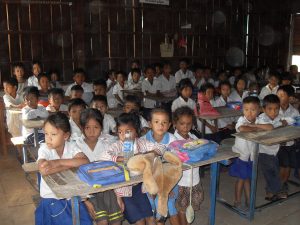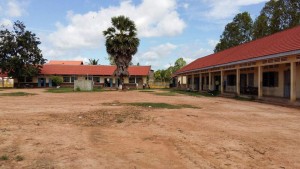Cambodia Education
now browsing by tag
National Budget Plan 2017 of Cambodia Government to renew poor education reform
Political Paradigm of Pragmatism from the Khmer Youth part 87

Courtesy: NotEnoughGood
This part (87), Mr. Sophan analysed on Budget Plan 2017 sent by the government of Cambodia for approval from the parliament. As he focused on poor engagement and low budget allocation to the Ministry of Education, the bamboo shoots of future old bamboos is just a useful rhetoric for Cambodia. His recommendations has covered large topic of child development.
From now on, Cambodian children should be taken care and infused following indicators to ensure they are truly young bamboo seeds for old bamboos:
- Emotional maturity (ភាពចាស់ចិត្តចាស់គំនិត): students-centered pedagogy and allowing more space for children to play and learn from their own intuitive is better than to having teacher keep eyes on them as well as lead them in all time. Good teachers will teach students to seek knowledge by themselves by facilitating road-map for them. Schools of early childhood learning is exactly a playground. Children love to play, and they are grown up from such plays.
- Social competence(សមត្ថភាពសង្គម): working as a team is imperative to imply in this real world, not a dream world. Cambodian schools are good in helping students to walk alone into the uncertainty of their future. Many times, this model has failed students to incorporate with others in achieving common goals, and conflicts as well as violence has always happened in Cambodian society because of lacking team-building. Many world’s important days and holidays of the nation, are good in calendar and students are likely forced to memorize them. But in developed countries, pre-school students, kindergarten to grade 5, are involving with those days by different classroom activities such as drawing, visualizing, photo-copying, imagining, analyzing, and school tripping to those sites etc. It it normal to hearing students take turn to speak on microphone about the daily schedule and reporting news during each important session of schooling. It is normal to see students take care other students and helping them with traffic etc.
- Physical health and well-being(កាយពលនិងសុខមាលភាព): lacking nutrition and hygiene are one part, but school with no playground and community with no recreation center etc. are the most unaware by the government in bringing physical health, mental health, and well-being of the students.
- Communication skills and general knowledge(កំរិតទំនាក់ទំនងគ្នាល្អនិងចំណេះដឹងទូទៅ): my personal experience from grade 12 has been a live memo as I couldn’t communicate anything useful with the outside world at all. I cannot apply my knowledge from school with the real world at all. I asked myself that as I was a number one student in classroom on both math and literature made me shy, none-confrontational, avoiding, and unproductive at work like this or what?
- Language and cognitive development(ការអភិវឌ្ឍន៌ជំនាញភាសានិងបញ្ញាញាណ): in developed countries, students are encouraged to learn at least two languages. Many universities accept students with bilingual or multilingual only. Researches found ability to speak many languages assure students’ high competency.
How Cambodia government invest in human capital?
Introduction:

Courtesy: NotEnoughGood
National capitals to build a country are categorized by different perspectives but human capital, social capital, natural capital, and cash flow capital, have been broadly discussed by researchers and academics. Hence, human capital has been viewed as the most important means leading to sustainable development.
But Cambodia has been criticized on its lacking of political will to develop “human capital”.
History Snapshot:
The aura of cold war devastated Cambodia in all fields, and human capital which is one of the essential backbones of this nation has been nationwide ruined. Socially, the social bonding and trust have been disintegrated. Natural resources have been plundered by the elites. Educational system has significantly been raised up from zero spot to some level of political propaganda. The theory of the more learned persons teach the less learned persons are pervasively implemented. School infrastructures are not sufficient to the need of viable schooling environment. Curriculum is not up to date. Teaching pedagogy and teachers’ salary are not an incentive to produce human resource at all.
The Continuing Lie of Young Bamboo Seeds are future of Old Bamboos:
This saying is very popular in Cambodia among other national proverbs. But after the cold war, no one has ever thought of or had political will to put it into action. Cambodian children who are considered the young bamboo seeds have continually been exploited and spoiled to the core. The teaching of respecting and preserving tradition and culture have been indulgent to degrade other qualities of students such as social competency and emotional maturity. These downgrading are at the verge of severe students’ vulnerability. In Western education systems, children starting from kindergarten have been vastly taken care to ensure they grow up with citizenship ability and responsibility. Schools are central of students’ transformation than pacification in among those countries.
As I observed, a pre-school education system operating in Canada at a provincial schools level, a research finding found 1 in 3 of B.C. children start school vulnerable in one or more areas that are critical to their healthy development. As I have always participated in Parents Council Meeting of school that my kid is learning with, the debate on children nutrients are not in the agenda because with developed countries, children have been taken care very well in providing sufficient nutrients for their mental and physical growth.
Cambodia is in contrast, as major families are living with dire poverty, the diets for children are plainly dominantly rice with less or none nutritious food. Lacking hygiene is also a big causes of disease and abnormal growth of children. As these nutrients and hygiene are basic need for children to healthily grow up has not been prioritized by the government, other factors of education development are remained speechless. Thus, political influence has been pervasively undermining children growth within schools compounds. Beside of attempting to influence professionalism and independence to conduct proper teaching profession of the teachers, the pressure of their not-make-end-meet salary is one of the obstacles politics has taken over the growth of children.
From now on, Cambodian children should be taken care and infused following indicators to ensure they are truly young bamboo seeds for old bamboos:
- Emotional maturity (ភាពចាស់ចិត្តចាស់គំនិត): students-centered pedagogy and allowing more space for children to play and learn from their own intuitive is better than to having teacher keep eyes on them as well as lead them in all time. Good teachers will teach students to seek knowledge by themselves by facilitating road-map for them. Schools of early childhood learning is exactly a playground. Children love to play, and they are grown up from such plays.
- Social competence(សមត្ថភាពសង្គម): working as a team is imperative to imply in this real world, not a dream world. Cambodian schools are good in helping students to walk alone into the uncertainty of their future. Many times, this model has failed students to incorporate with others in achieving common goals, and conflicts as well as violence has always happened in Cambodian society because of lacking team-building. Many world’s important days and holidays of the nation, are good in calendar and students are likely forced to memorize them. But in developed countries, pre-school students, kindergarten to grade 5, are involving with those days by different classroom activities such as drawing, visualizing, photo-copying, imagining, analyzing, and school tripping to those sites etc. It it normal to hearing students take turn to speak on microphone about the daily schedule and reporting news during each important session of schooling. It is normal to see students take care other students and helping them with traffic etc.
- Physical health and well-being(កាយពលនិងសុខមាលភាព): lacking nutrition and hygiene are one part, but school with no playground and community with no recreation center etc. are the most unaware by the government in bringing physical health, mental health, and well-being of the students.
- Communication skills and general knowledge(កំរិតទំនាក់ទំនងគ្នាល្អនិងចំណេះដឹងទូទៅ): my personal experience from grade 12 has been a live memo as I couldn’t communicate anything useful with the outside world at all. I cannot apply my knowledge from school with the real world at all. I asked myself that as I was a number one student in classroom on both math and literature made me shy, none-confrontational, avoiding, and unproductive at work like this or what?
- Language and cognitive development(ការអភិវឌ្ឍន៌ជំនាញភាសានិងបញ្ញាញាណ): in developed countries, students are encouraged to learn at least two languages. Many universities accept students with bilingual or multilingual only. Researches found ability to speak many languages assure students’ high competency.
Why Cambodia Government is Lacking Political Will in Education?
By looking at the budget allocating for Education from previous years, and the budget draft for this upcoming year of 2017, Education is likely not in priority for the government at all. According to VOA news, government draft law indicated increase 20.4 percent or 822 millions USD in Defence, Security and Public Order. While education and health sector are not sufficient. According H.E.Son Chhay, spending on Education is allocated 2.7 percent of total GDP (Gross Domestic Product) comparing to Vietnam is 5.5 percent, Indonesia is 4.5, and Thailand is 4.5 percent.
While Cambodia has obtained peace, the need on spending on arm-force is questionable while the needed sectors such education and health are not within government’s priority.












